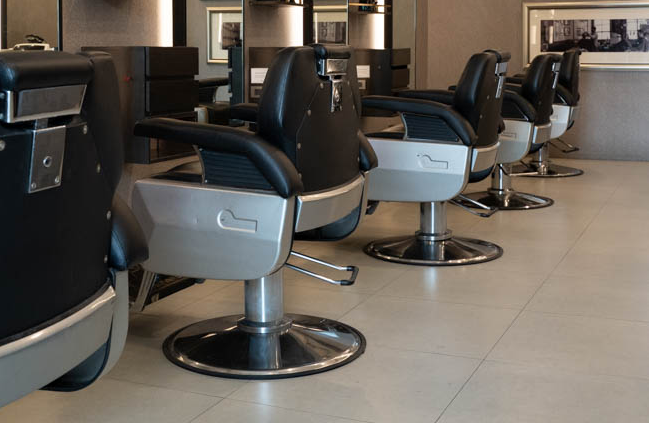The barbershop has been a divisive subject amid the COVID-19 pandemic. Parts of Europe are opening them first before other industries. Australia, on the other hand, did not force them to shut down at all. Singapore, previously listing hair grooming as an “essential service,” has closed shop. And in the Philippines, people in areas stepping down from enhanced community quarantine (ECQ) to general community quarantine (GCQ) may now visit their neighborhood barbers beginning May 1.
“Beyond essential services like food shops and pharmacies, identifying the businesses that provide the greatest public benefit seems like a near-impossible task,” admits Jamie Waters, fashion editor of global affairs and lifestyle magazine Monocle, in an email interview. “It’s interesting to see the different tiers of services that are being prioritized and allowed to open first: in Switzerland and Norway, it’s been flower shops, garden centers, massage and tattoo parlors, and beauticians. Is it strange that these are being put before other types of retailers? Possibly,” he says.
“[However,] I don’t think that’s just a European thing,” he notes. “In Australia, where my family lives, hairdressers and barbershops are among the few places that have not been forced to close this whole time.” In the past few weeks, barbershop and salon owners have been frustrated over the local government’s changing and unreasonable rules for their establishments. For instance, they criticized a now-defunct 30-minute-per-client restriction, calling it unfeasible and gendered. They also noted that it was impossible to give haircuts and shampoos under the “one person per four square meters” social distancing rule indoors.
Hence, barbers and hairdressers, backed by the Australian Hairdressing Council, have been clamoring for their industry’s shutdown. While some are closing shop on their own, others hesitate to do so because of the lack of support and fear of legal action against them. Without concrete government directives for suspension, businesses may find it hard to negotiate rental costs with their landlords. Moreover, laid-off employees may sue employers under section 524 of Australia’s Fair Work Act, which states that payroll may be withheld only under work stoppages beyond the owners’ control.
Cutting services
Closer to home, Singapore initially listed barbershops as an “essential service” under their “circuit breaker” phase (elevated measures to curb COVID-19), which began last April 7. Part of Singapore’s vote of confidence in their barbers may stem from their compliance with strict sanitation measures that have been in practice earlier this year. (As of writing, with tighter lockdown measures enforced last April 22, hair grooming services have been cut from the list of essential services.)
“Before the government enforced circuit breaker measures, we were already implementing strict preventive procedures and safe distancing standards, according to the Clean Singapore guidelines,” says Samantha Ong, marketing director of Spa Esprit Group (SEG), Beauty Division. For instance, We Need A Hero, SEG’s male grooming brand, followed a stringent 10-step hygiene protocol that required barbers to mask up, don gloves, sanitize all tools and equipment, and clean workstations with hospital-grade disinfectant before and after every client. Hand sanitizers were also prepared in all branches for client use.
Ong says that all of their team members went through regular temperature checks daily. Those who showed symptoms were not allowed to report, and they had to secure medical clearances before getting back to work. “At the time, we also required all customers to declare their health and travel histories. We asked those who were feeling unwell or had travelled in the past 14 days to reschedule their appointments,” she adds.
“Things are definitely going to be different post-circuit breaker period, but we are confident that our customers will return as we have been receiving numerous appointment requests,” quips Ong.
—
Locally, barbershops did not make the cut for “basic necessities” listed under the Office of the President’s ECQ memorandum dated March 16. Owners were left with no choice but to shut down, but not without continued support for their team. “We were able to provide wages and additional cash assistance before our staff left for their homes,” says Martin “Bug” Warren, general manager and co-founder of Felipe and Sons Haberdashery. “We also launched an initiative which allows our clients to pre-pay for services that they can avail post-ECQ. The proceeds were distributed across our barbers and the whole team.”
Marco Pascual, president of Bruno’s Services Corporation, echoes the same sentiments. “Some of our technicians and barbers have been with Bruno’s Barbers for 15 years, on average, so financial assistance, constant communication, and employee security have been our top priority. We wanted to assure our staff that, after the lockdown, they have jobs to go back to.”
In terms of sanitation efforts, local barbershops can take cues from We Need A Hero and Singapore. Customers can expect more disinfectants, latex gloves, face shields and masks, and the like when they visit their preferred barbers in the future. On top of these, Felipe and Sons is also toying with the idea of more contactless transactions. “Moving forward, we’ll encourage our clients to book and pay online in advance. As much as possible, we’d like our clients to be punctual, so that we can minimize crowds and contact within our spaces,” Warren shares.
The barber as therapist
Pascual and Warren lament that local barbershops were not allowed to operate, even partially, during the ECQ. This prevented them from granting grooming requests made by several hospitals for their front-line workers. “The hospitals understand that a good haircut can lift one’s spirits. As much as I wanted to, for safety and legal reasons, we couldn’t send barbers from our end,” admits Warren. Pascual even recalls one request straight from a particular hospital’s psychology department. “For me, that emphasized how haircuts work wonders for one’s mental well-being. Barbershops should have been a quasi-essential service during the ECQ,” he admits.
“Besides, we have the best barbers in the world—did you know that our homegrown talents get recruited by stylists in Canada and Australia?” Pascual quips. “More than technical skill, I think our hospitable nature plays a big part—after all, barbering is a great display of hospitality. This further underscores why haircuts are an integral service, especially during these times.”
Waters offers similar thoughts, noting how barbers are like therapists. “Barbers and hairdressers play a special social role in our societies. I don’t know whether it’s because we’ve got our back to them—almost like a confessional—or because we’re in such close proximity, but people spill their hearts out [to them],” he observes.
“I’m good friends with my barber – I always go to the same guy—and every two months it’s like catching up with an old friend who’s totally removed from my work and social circles. You can cover deep topics while in the chair. That sort of relationship can’t be replaced by buying hair clippers on Amazon [and shaving your head at home,]” he concludes.



